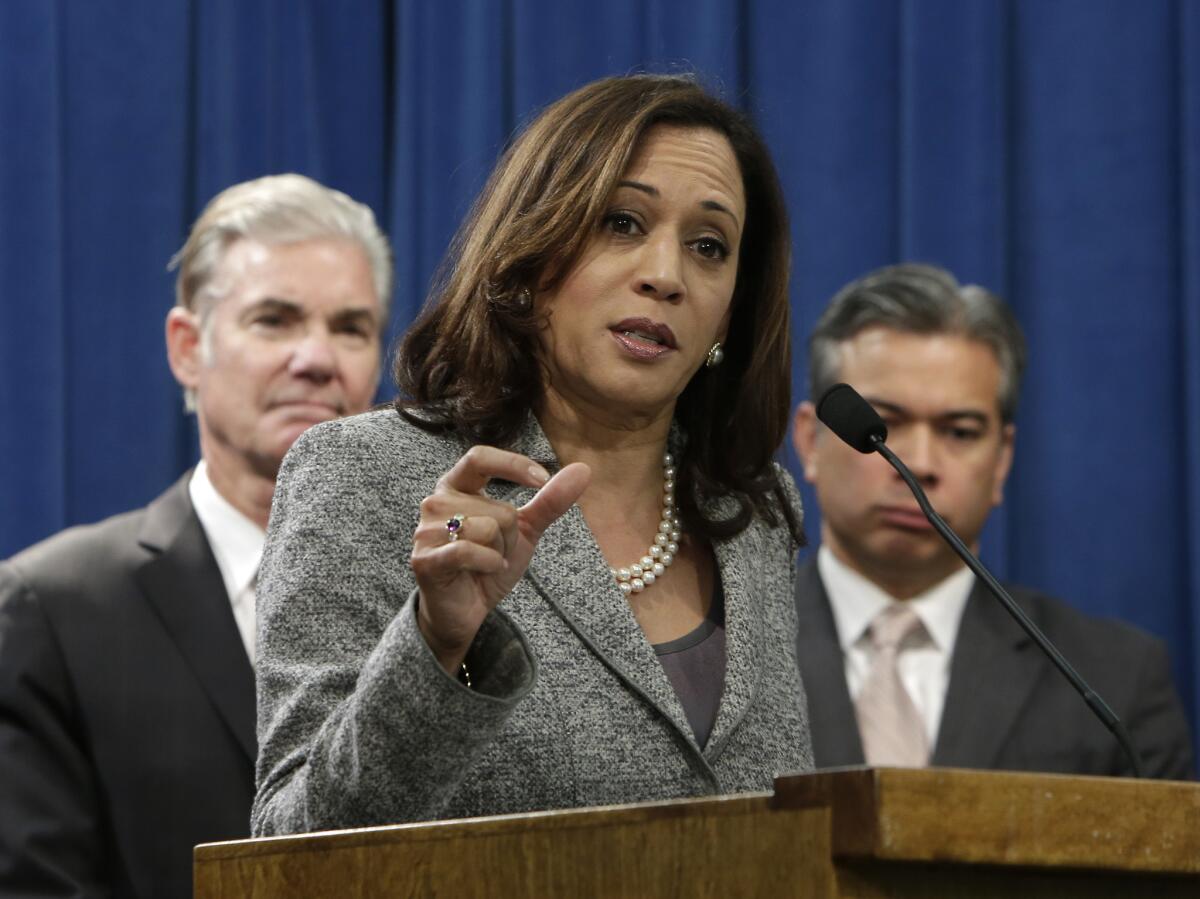Endorsement: Kamala Harris for attorney general

- Share via
Six challengers stand in the way — barely — of California Atty. Gen. Kamala Harris as she seeks a second term. Several of them are, to be kind, colorful; one or two may have political futures. One will wind up on the Nov. 4 general election ballot with Harris as a result of the state’s top-two primary system. But none is currently suited to be the state’s top justice official and none, certainly, would be an improvement over Harris, who has done a generally good job in the office. In this race, an endorsement is easy. The Times urges voters to reelect Harris.
When a competent incumbent is seeking reelection and the field is not competitive, why bother endorsing?
In large part because it is an opportunity to examine the incumbent’s performance and lay out hopes for a second term. In the case of Harris, The Times sees her record so far as a work in progress, with much potential yet unfilled.
Harris was not The Times’ choice four years ago, when she defeated Los Angeles County Dist. Atty. Steve Cooley in an election that was so close it took weeks after election day to determine the victor.
But there were nonetheless good reasons to hail her arrival in statewide government. There was a palpable feeling that California was at a turning point in criminal justice, with prisons filled beyond capacity and with federal judges demanding the release of inmates to free up space. Harris had written a book on rethinking the justice system to end the costly cycle of recidivism. Her message of remaining tough on violent crime while redirecting resources in order to ease a safe and successful return to society of low-level felons was the right statement at the right time.
Not long after her election, Gov. Jerry Brown proposed and the Legislature adopted a program generally known as criminal justice realignment, in which many newly sentenced felons are sent to county jails instead of to state prisons and many inmates leaving prison are supervised by county probation officers instead of state parole agents.
Realignment caused scores of local law enforcement officials and elected leaders to predict criminal mayhem. The message relayed to Californians was dominated by blame and fear. There was a need for the state’s top justice leader to spotlight the real problems, debunk the false ones and explain to residents why the policy reflected the principles that she had set forth in her previous work on criminal justice reform.
But Californians heard too little from Harris on realignment, and for too long. It often seemed as though she were waiting to see how it would work out before committing herself. And it is true that the program was Brown’s and the Legislature’s, and that it was not up to Harris to defend it. It was, however, up to her to explain it and to either try to make it work or push for better options.
Last November, more than two years after realignment took effect and thus rather late in the game, Harris unveiled a new Division of Recidivism Reduction and Re-Entry to offer counties assistance on data and best practices. It was the right move, but tardy for someone with Harris’ background in recidivism reduction.
Let’s be clear: Harris’ handling of realignment has by no means been a disaster, and she has in recent months ramped up her office’s work on a host of related programs, such as education-based incarceration. It’s exactly the kind of work California needs from Harris, and exactly the kind of focus she should demonstrate in a second term.
California cities and counties also could have used more guidance from Harris’ office several years ago when fumbling with ordinances to deal with medical marijuana under Proposition 215, especially at a time when federal prosecutors were sending mixed signals.
In other areas, Harris’ approach has been less overly cautious and in some respects more welcome. Although The Times urged her to join other states earlier in reaching a settlement with banks accused of improper foreclosures, she ultimately won a larger degree of debt reduction for homeowners and a larger damages award. And she pressed the Legislature to adopt a Homeowners Bill of Rights to ensure fair lending and borrowing practices.
In fact, some of Harris’ best work has been on guiding bills through the Legislature. She currently has a package of proposed laws to deal with truancy, widely seen as one of the feeders of the criminal justice system. And she has taken a strong stand against sex trafficking.
Some of Harris’ opponents criticize her for spending too much time in Washington and on programs that on their face have less to do with the traditional role of attorneys general and are more wide-ranging — like reducing recidivism instead of just locking people up. There is a joke among some attorney general watchers that “AG” stands for “almost governor,” and there is little doubt that Harris has higher office in mind.
But there is nothing wrong with political ambition as long as it doesn’t get in the way of performing the task at hand. And in fact, Harris is often at her best when she expands the common understanding of what an attorney general does. She has begun to come into her own, and Californians should expect — and demand — more of her in a second term.
More to Read
A cure for the common opinion
Get thought-provoking perspectives with our weekly newsletter.
You may occasionally receive promotional content from the Los Angeles Times.









